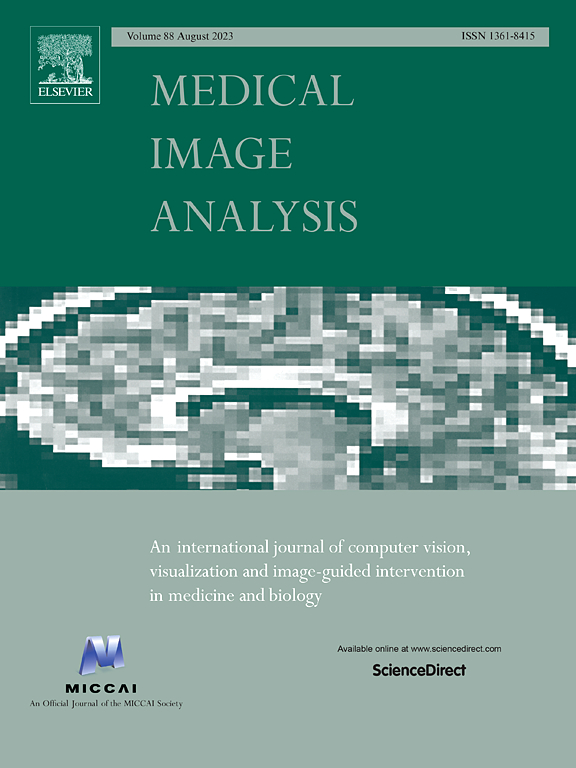用于医学图像配准的循环推理机。
IF 11.8
1区 医学
Q1 COMPUTER SCIENCE, ARTIFICIAL INTELLIGENCE
引用次数: 0
摘要
图像配准对于医学图像应用至关重要,其中需要对多个图像中的体素进行定性或定量分析。随着深度神经网络和并行计算的发展,基于深度学习的医学图像配准方法以其灵活的建模和快速的推理能力而具有竞争力。然而,与传统的基于优化的配准方法相比,速度优势可能以牺牲推理时的配准性能为代价。此外,理想情况下,深度神经网络需要大量的训练数据集,而基于优化的方法无需训练。为了提高配准精度和数据效率,我们提出了一种新的图像配准方法——递归推理图像配准网络。RIIR以迭代的方式作为注册问题的元学习求解器。RIIR通过学习优化的更新规则,将隐式正则化与显式梯度输入相结合,解决了准确性和数据效率问题。我们广泛评估了RIIR在脑MRI、肺CT和定量心脏MRI数据集上的配准准确性和训练数据效率。我们的实验表明,即使只有5%的训练数据,RIIR也优于一系列基于深度学习的方法,显示出很高的数据效率。我们消融研究的主要发现强调了元学习循环推理框架中引入的隐藏状态的重要附加价值。我们提出的RIIR为基于深度学习的医学图像配准提供了一个高度数据效率的框架。本文章由计算机程序翻译,如有差异,请以英文原文为准。
Recurrent inference machine for medical image registration
Image registration is essential for medical image applications where alignment of voxels across multiple images is needed for qualitative or quantitative analysis. With recent advances in deep neural networks and parallel computing, deep learning-based medical image registration methods become competitive with their flexible modeling and fast inference capabilities. However, compared to traditional optimization-based registration methods, the speed advantage may come at the cost of registration performance at inference time. Besides, deep neural networks ideally demand large training datasets while optimization-based methods are training-free. To improve registration accuracy and data efficiency, we propose a novel image registration method, termed Recurrent Inference Image Registration (RIIR) network. RIIR is formulated as a meta-learning solver for the registration problem in an iterative manner. RIIR addresses the accuracy and data efficiency issues, by learning the update rule of optimization, with implicit regularization combined with explicit gradient input.
We extensively evaluated RIIR on brain MRI, lung CT, and quantitative cardiac MRI datasets, in terms of both registration accuracy and training data efficiency. Our experiments showed that RIIR outperformed a range of deep learning-based methods, even with only 5% of the training data, demonstrating high data efficiency. Key findings from our ablation studies highlighted the important added value of the hidden states introduced in the recurrent inference framework for meta-learning. Our proposed RIIR offers a highly data-efficient framework for deep learning-based medical image registration.
求助全文
通过发布文献求助,成功后即可免费获取论文全文。
去求助
来源期刊

Medical image analysis
工程技术-工程:生物医学
CiteScore
22.10
自引率
6.40%
发文量
309
审稿时长
6.6 months
期刊介绍:
Medical Image Analysis serves as a platform for sharing new research findings in the realm of medical and biological image analysis, with a focus on applications of computer vision, virtual reality, and robotics to biomedical imaging challenges. The journal prioritizes the publication of high-quality, original papers contributing to the fundamental science of processing, analyzing, and utilizing medical and biological images. It welcomes approaches utilizing biomedical image datasets across all spatial scales, from molecular/cellular imaging to tissue/organ imaging.
 求助内容:
求助内容: 应助结果提醒方式:
应助结果提醒方式:


